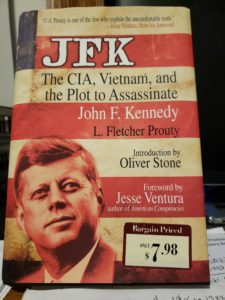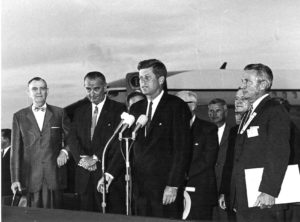For some time I’ve been aware of Fletcher Prouty, and that he had a story to tell in the JFK assassination. He was mentioned in Oliver Stone’s movie JFK (Donald Sutherland’s character “X”). He’s been in other books or articles about the assassination. Yet, I’d never read anything he actually wrote about it.

So, when I was at Barnes & Noble one time and saw his book JFK: The CIA, Vietnam, and the Plot to Assassinate John F. Kennedy, I naturally bought it. I had it for close to a year before it found its way to the top of the reading pile, a pile I haven’t had much success at reducing recently.
Alas, I was disappointed in it. All this time hoping he wrote about the assassination, only to find his book was barely worth reading.
First, his story. Prouty was in the Army Air Corps in WW2, having a variety of assignments during the war and right after. During the Cairo and Teheran conferences in late 1943, he was pilot for delegations attending the conference, particularly the Chinese delegation—all except for the Chinese leader, Chiang Kai Shek and his wife. He starts his narrative there, saying decisions made at the Cairo conference had implications in Vietnam and later. The Cold War, he said, started at Cairo and Teheran, when the USA and England teamed with the Chinese in silent battle against the USSR.
Then, he says he was aware that, when the Japanese surrendered, all the war materiel being accumulated on Okinawa had to go somewhere, and it was all taken to Hanoi to help Vietnam, then one country and led by Ho Chi Mihn, in its war against the lingering French colonists. That materiel would eventually be used against the USA.
The problem, Prouty said, was the US intelligence services, first the OSS then the CIA, ventured far outside the field of intelligence gatherings into covert operations. In Vietnam, those operations were keeping things fomenting in a country that was, at best, loosely a country in fact, so that attention would go there. The domino theory of nations falling to the communists was but a smokescreen for the CIA’s real work, says Prouty.
It’s all tied in to the military-industrial complex that Eisenhower warned us about. The CIA keeps things roiling in different parts of the world. The USA needs to be prepared, so keeps buying military hardware. Industrialists thus profit, and taxpayers lose. That sort of makes sense, but I don’t believe he fully makes the case.

As I’m reading, I’m wondering how this ties to the JFK assassination. Prouty finally gets to that. He makes a big deal about a National Security Memorandum which shows that Kennedy was withdrawing from Vietnam, a slow withdrawal from our troop strength of 16,000 down to none over a three year period. This went against what the CIA, by this time a strong power in the government, wanted. So they assassinated Kennedy, who had said in casual conversation he was going to break the CIA into a thousand pieces.
Prouty doesn’t make his case well. Oh, he talks about this agent and that, this operation and that, showing how they weren’t meant to do anything but promote unrest in Vietnam. But he doesn’t say how the CIA accomplished the assassination. How was Oswald involved, or was he involved at all, if it was a CIA plot? Who were the shooters, and how did they get away unseen? How is it that the Warren Commission uncovered none of this? An enquiring reader wants to know.
Prouty’s book is poorly written. The NSM mentioned earlier is covered over and over in the book. Each time Prouty gives us the full story about it. He’ll say something like “…as covered in NSM #268, which concerned troop withdrawals from Vietnam by the end of 1964…” He does this over and over. It’s as if he doesn’t trust his readers to read about this NSM the first time and understand what it covered thereafter throughout the book. He does this over and over, acting as if his readers were two yea- olds who needed to have the same thing explained to them many times. He does this with many things in the book.
He had some important things to say, but, having finished the book back in August of this year, those important things are already fading from my memory. And that’s not a good testimony for a non-fiction book.
If I could talk with the author, I would say, “Mr. Prouty, sir, you blew it. You had a good story to tell—at least I think you do, but you got off in the weeds and didn’t trust your readers. Hence, I can’t recommend your book.”
Who should read this? Only die-hard Kennedy assassination researchers and students who want to leave no related book unread.
This book will stay on my shelf, with other Kennedy books. I might even read it again, in my retirement, and see if I can glean more and better information from it. For right now, it’s going to get a mere two-stars from me on an Amazon and Goodreads review.